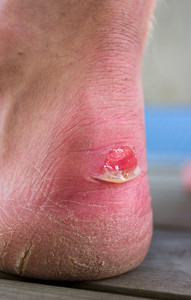 Typically, blisters on the feet are caused by repeated friction, commonly due to wearing poorly fitting shoes. Occasionally, there may be other conditions present such as hammertoes or bunions, which may alter the structure of the foot. Blisters can be avoided by choosing shoes with a wide area for the toes, in addition to checking the lining of the shoe, confirming that the seams are not raised. This ailment is more likely to develop if the feet are moist, which typically softens the skin. This may cause the skin to tear, providing the right environment for blisters to form. If you discover that you have a blister, it may be beneficial to cover it with a bandage in addition to eliminating any friction by wearing shoes that fit correctly. Typically, it’s not recommended to pop a blister, because this may lead to infection. If you have blisters on your feet, please consider scheduling a consultation with a podiatrist for a proper evaluation and treatment options.
Typically, blisters on the feet are caused by repeated friction, commonly due to wearing poorly fitting shoes. Occasionally, there may be other conditions present such as hammertoes or bunions, which may alter the structure of the foot. Blisters can be avoided by choosing shoes with a wide area for the toes, in addition to checking the lining of the shoe, confirming that the seams are not raised. This ailment is more likely to develop if the feet are moist, which typically softens the skin. This may cause the skin to tear, providing the right environment for blisters to form. If you discover that you have a blister, it may be beneficial to cover it with a bandage in addition to eliminating any friction by wearing shoes that fit correctly. Typically, it’s not recommended to pop a blister, because this may lead to infection. If you have blisters on your feet, please consider scheduling a consultation with a podiatrist for a proper evaluation and treatment options.
Blisters are prone to making everyday activities extremely uncomfortable. If your feet are hurting, contact one of our podiatrists of The Podiatry Center, PC. Our doctors can provide the care you need to keep you pain-free and on your feet.
Foot Blisters
Foot blisters develop as a result of constantly wearing tight or ill-fitting footwear. This happens due to the constant rubbing from the shoe, which can often lead to pain.
What Are Foot Blisters?
A foot blister is a small fluid-filled pocket that forms on the upper-most layer of the skin. Blisters are filled with clear fluid and can lead to blood drainage or pus if the area becomes infected.
How Do Blisters Form?
Blisters on the feet are often the result of constant friction of skin and material, usually by shoe rubbing. Walking in sandals, boots, or shoes that don’t fit properly for long periods of time can result in a blister. Having consistent foot moisture and humidity can easily lead to blister formation.
Prevention & Treatment
It is important to properly care for the affected area in order to prevent infection and ease the pain. Do not lance the blister and use a Band-Aid to provide pain relief. Also, be sure to keep your feet dry and wear proper fitting shoes. If you see blood or pus in a blister, seek assistance from a podiatrist.
If you have any questions, please feel free to contact our office located in Millburn, NJ. We offer the newest diagnostic and treatment technologies for all your foot care needs.
Read more about Blisters on the Feet